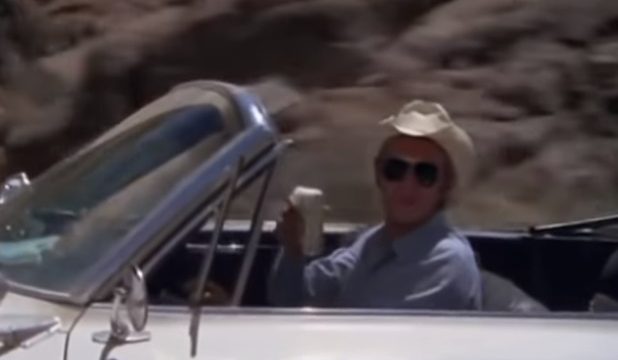“The only true currency in this bankrupt world is what you share with someone else when you’re uncool.” — Lester Bangs, Almost Famous
“I made a film where nobody got shot and nobody went to see it.” — Sam Peckinpah
When various production problems meant the 1972 Jim Thompson adaptation The Getaway needed a new director, star Steve McQueen reached out to Sam Peckinpah. The two had just teamed up for Junior Bonner, where McQueen felt he had done some fine work. On paper, it is a can’t-miss alignment of crime, cool and carnage. Thompson! McQueen! Peckinpah! And this young guy named Walter Hill handling the adaptation!
There’s a scene halfway through the movie where an on-the-lam McQueen realizes he’s about to get nabbed by the law: he calmly walks into a pawnshop, buys a shotgun, loads it up, walks outside and blasts the everloving shit out of the cop car that was set to pick him up. It fucking owns, the coolest thing you could want to see. In comparison, McQueen spends the majority of Junior Bonner on the ropes; he loses more showdowns than he wins, and his biggest win is based on how long he can defer a loss, how much he can put off being thrown into the dirt. He also literally gets clotheslined while riding a horse with his shitfaced dad.
Per Wikipedia: “Under his contract with First Artists, McQueen had final cut privileges on The Getaway. When Peckinpah found out, he was upset. Richard Bright said that McQueen chose takes that ‘made him look good’ and Peckinpah felt that the actor had played it safe: ‘He chose all these Playboy shots of himself. He’s playing it safe with these pretty-boy shots.’” For all its depravity and violence, its cool cachet, The Getaway doesn’t take the risks for glory, for pleasure, that Junior Bonner does. It plays safe —Bonner plays for keeps.
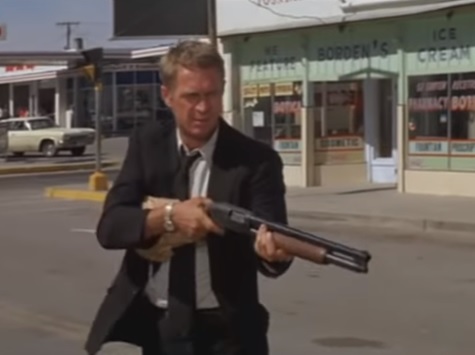
The Getaway takes place in flophouses and big cars and dead-end towns, the ecosystem of many a ’70s crime flick but one that feels half-hearted here, even if you don’t know that the original story ends in a far worse cannibalistic hellhole. McQueen and Ali MacGraw, who were fucking like rabbits between takes (this while MacGraw was married to producer Robert Evans), somehow have zero chemistry as lovers on the run, fleeing with a bag of cash from a robbery gone bad and trying to repair a relationship strained by McQueen’s years in prison. But there is no passion to be seen or to be reclaimed; whether McQueen and MacGraw are right or wrong for each other, there needs to be some spark that shows why the connection was made in the first place.
If McQueen and MacGraw are an empty bottle, the magnificently scuzzy and foul Al Lettieri, in possibly the grungiest, sweatiest performance of the ’70s (and this includes Warren Oates in Bring Me The Head Of Alfredo Garcia), provides the cheap whiskey. Lettieri is an accomplice of McQueen’s, betrayed only because McQueen beat him to the double-cross. He spends much of the film hunting McQueen and MacGraw down while in the company of a cuck doctor, whom he forces to treat his wounds, and the doctor’s wife, who he starts fucking immediately. Lettieri eats fried chicken and laughs and gropes the doctor’s wife in the back of the doctor’s car, driven by the doctor himself. The doctor kills himself in the bathroom of a cheap motel while Lettieri rails his horny wife. Bloody Sam, everyone! When Lettieri is on screen, the movie is alive, with ugliness and contempt perhaps. but those things are real. McQueen, shotgun ownage aside, feels like a cardboard cutout, a persona more than a person.
The Getaway was written in the ’50s and was filmed in the’ 70s as a contemporary piece, but while the movie catches aspects of the times, it doesn’t feel like it belongs there more than anywhere else. It ultimately functions as marriage therapy, a new beginning, and Peckinpah is a person who understands endings. And what is a Western but a limning of the end, the terminator set into relief by the evening redness in the west or the signpost of civilization on a dangerous plain? Ride The High Country looks at that high country’s settlement, The Wild Bunch mourns the idea of outlaws who can still ride against bloated generalissimos and corporate railroad whores. These stories find endings in the final ending of death, which is to be honest, pretty badass. What happens when that’s not an option?
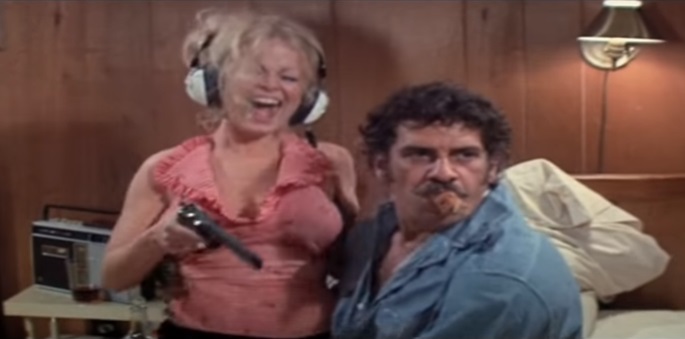
In Junior Bonner, McQueen is introduced via an enormous widescreen credits sequence of his body getting beat up. He’s trying to ride a bull at a rodeo — eight seconds is the magic time to beat, and every one of those seconds feels like an eternity — and gets pounded into the dust; the credits use a quartile split screen to further isolate him within the space. He walks it off, tapes up his ribs, hitches his trailer to his beat-up car, and drives on. He’s got another show to do.
The movie follows McQueen’s title character over a day or so as he returns to Prescott, Arizona — his family’s home, and the home of the oldest continual rodeo in the country. He meets up with mother Ida Lupino, father Robert Preston, brother Joe Don Baker (in a superb review, Adrian Danks talks about how Peckinpah “had a way of choosing actors who could populate a vivid fresco of expressive faces, varied body types and vocalities”) as he prepares for the big hometown show, where he bribes Peckinpah regular Ben Johnson for a chance at a prize bull, to show that he’s still got what it takes.
In some ways, Jeb Rosebrook’s screenplay for Junior Bonner could be a blueprint for every lame-ass Sundance family dramedy. The Bonners have fractured, with Baker’s greedy younger son buying out the land his father owned at a price way under market rate so he can continue his profitable mobile home business. Preston, who is in the hospital after driving drunk into a ditch, has blown all his money on prospecting for silver in the States and now wants to try his hand digging for gold in Australia. And Lupino, watching the men she loves continually turn toward foolish ends, is ready to foreclose on her independence and become a part of Baker’s real estate machine. These people all love each other and often can’t stand each other — McQueen sucker punches Baker through a window and willingly gets sucker punched in return later on — and are trying not to realize that this is ultimately going to drive them apart after this brief reunion.
The family home is about to be bulldozed at the start of the movie. McQueen drives his car in front of an earth mover to stare it down. The guy driving the earth mover lurches forward, ready to drop a ton of dirt and rocks on McQueen’s already-beaten-up car and McQueen bugs on out of there. One more showdown he loses, another fizzled moment of cool. The most painful part of the movie comes when McQueen has to admit to his father that he’s “busted,” flat broke and unable to help finance that Australia trip — a train separates the two after this admission and McQueen can’t even look in his dad’s direction anyway, his face closer to tears than you would ever believe possible.
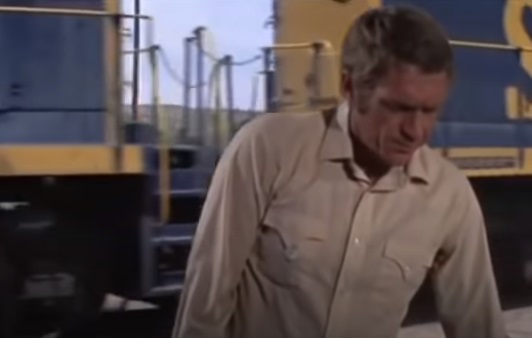
All of this is making McQueen sound like a failure, and he’s not. Both his brother and Johnson, who runs a large cattle operation, want him to work for them — not out of pity but because he’s got authenticity and honesty that would be a credit to any organization, and his independence would be a valuable signifier for the corporate. He’s still Steve goddamned McQueen, able to move loosely yet without wasted motion and make a still face suggest depth behind it. He charms Barbara Leigh, the girlfriend of an old rival and their courting lets Peckinpah restage the climax of The Wild Bunch as farce. At a crowded bar, McQueen locks eyes with Leigh (his girlfriend at the time, and boy do they click more than he and MacGraw do later), and you can see Lyle Gorch’s words go through his mind: “Why not?” So he walks over during a slow song and brings her out on the dance floor while her boyfriend fumes, and when yet another cowboy moves in on the next song, the boyfriend loses it, throwing a punch that starts a massive brawl. Heads are knocked, beer is spilled, tables are flipped, an absolutely massive cowhand clears people away with a relentlessness that puts a Gatling gun to shame. (Meanwhile, McQueen and Leigh have sneaked off for some implied oral sex in a phone booth.) It’s a nice win for McQueen and some rip-snortin’ mindless destruction for everyone else; no one is really hurt and everyone gets back to drinking soon enough.
The fight is no last stand, and there aren’t any heroes anymore. And surprisingly, there’s no real egg-sucking gutter trash either. Unlike Solute favorite Prime Cut, the agricultural festivities of this place between the coasts aren’t a cover for degeneracy or a powder keg of mob violence. Peckinpah films the big parade through town and the rodeo’s events straight, letting people take pride in a somewhat sanitized version of their heritage and what they still know how to make of it. Not that there isn’t humor as well, but it’s from the events themselves — Preston’s mangy dog sneaks into the arena and wreaks havoc on a cow-roping contest — not a jaundiced tone. We spend a lot of time watching McQueen and Preston at work here, showing off their roping and wrangling skills, and it’s clear why McQueen commands the respect he does.
And Peckinpah brings his quick cuts and intense close-ups, his respect for the action, to bear on McQueen’s final ride with his horned nemesis. And he wins! He breaks eight seconds, he’s still thrown off anyway, of course, but he made his time. He gets a decent chunk of prize money, and has to give half of it to Johnson, who helped stake him in the first place. The other half goes to a one-way ticket to Australia, to be delivered to his dad. McQueen doesn’t have time for that (although he does have time to take Leigh to the airport after a night of sweet lovin’). He’s got another show up the road, in Salinas. Time to do it all over again.
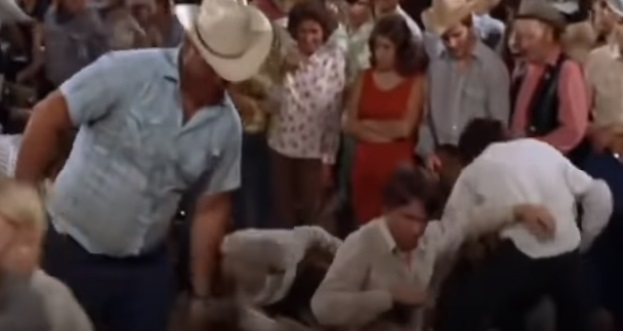
If The Getaway doesn’t end with a full happily ever after, it’s hard not to see a decent future for the main couple, still together and blessed by a rescue from Slim Pickens (could there be a better guardian angel?). They go through hell and come out the other side. McQueen in Junior Bonner ends the movie as he began it, on the road by himself, after going through a pretty normal, nice place and spending some time with his crazy family. That could be the story of a lot of people; it’s a slice of life, and since when are those cool? It’s not very exciting watching things change a little every day, whether it’s your abilities fading or the land you grew up in becoming a reflection of itself.
But here it’s as honest as the Bunch riding to their deaths, as Steve Judd wanting to walk into his house justified. McQueen shows what happens in unguarded moments and how hard some pills can be to swallow, but this is really Peckinpah sharing something uncool, that life goes on, and while you can always take your best shot, you don’t always get to choose your ending, and maybe that’s not so bad. People at the time didn’t want to hear that, Junior Bonner busted and The Getaway was a hit and the world moved on. When that happens, you can jump off or try to move with it. Jumping off looks cool — hell, it is cool. Hanging on is harder.
This article is indebted to Son of Griff and many conversations with him about these two movies.

